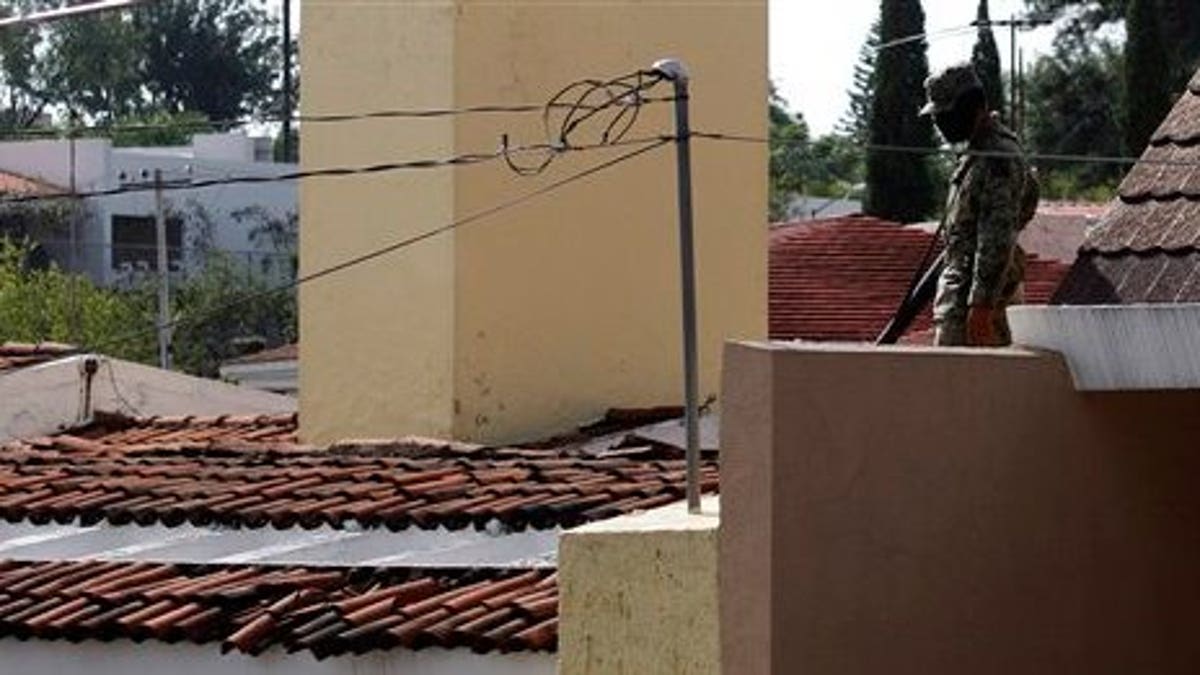
July 30: A soldier stands guard on the roof of the house where, according to Mexico's Defense Ministry, a top leader of the Sinaloa cartel, Ignacio Coronel Villareal, was killed in Guadalajara, Mexico. President Felipe Calderon launched a military offensive against organized crime in 2006. (AP)
MEXICO CITY – MEXICO CITY (AP) — Former President Vicente Fox is joining with those urging his successor to legalize drugs in Mexico, saying that could break the economic power of the country's brutal drug cartels.
Fox's comments, posted Sunday on his blog, came less than a week after President Felipe Calderon agreed to open the door to discussions about the legalization of drugs, even though he stressed that he remained opposed to the idea.
Fox said places that have implemented the legalization strategy have not seen significant increases in drug use.
"We should consider legalizing the production, distribution and sale of drugs," wrote Fox, who was president from 2000 to 2006 and is a member of Calderon's conservative National Action Party. "Radical prohibition strategies have never worked."
"Legalizing in this sense does not mean drugs are good and don't harm those who consume them," he wrote. "Rather we should look at it as a strategy to strike at and break the economic structure that allows gangs to generate huge profits in their trade, which feeds corruption and increases their areas of power."
He said the government could tax the sale of legalized drugs to finance programs for reducing addiction and rehabilitating users.
Fox also called for the quick withdrawal of the military from public security work, a measure Calderon ordered when he succeeded Fox in December 2006 and stepped up a crackdown on the cartels.
Fox, who left office with low popularity, has been criticized by some Mexicans for implementing an anti-cartel strategy aimed at arresting the gangs' leaders.
The approach led to power vacuums that fed fighting among rival cartels, bringing violence that has killed more than 28,000 people since Calderon took office. The government says the largest number of victims have been tied to gangs.
Fox wrote that drug violence has damaged "the perception and image of the country, and economic activity, particularly in tourism and foreign investment."
Mexico already has some of the world's most liberal laws for drug users, after eliminating jail time for possessing small amounts of marijuana, cocaine and even heroin, LSD and methamphetamine in 2009.
In Latin America, several countries have decriminalized possession of small amounts of some drugs for personal use, but legalization has made little headway in the region.
The issue came up at public forum on crime attended by Calderon in Mexico City on Tuesday, where analyst and writer Hector Aguilar Camin said Mexico should take steps toward legalizing "all drugs in general."
"It's a fundamental debate in which I think, first of all, you must allow a democratic plurality (of opinions)," Calderon said. "You have to analyze carefully the pros and cons and the key arguments on both sides."
Hours later, Calderon's office issued a statement saying that while the president was open to debate on the issue, he remained "against the legalization of drugs."
In his blog, Fox harshly criticized rampant drug violence, writing that "the first responsibility of a government is to provide security for the people and their possessions ... today, we find that, unfortunately, the Mexican government is not complying with that responsibility."
The city most affected by drug violence has been Ciudad Juarez, which lies across the border from El Paso, Texas.
Four senior federal police commanders in Ciudad Juarez were removed from their posts after subordinates accused them of having links to drug traffickers.
The action by the Public Safety Department came just hours after 200 federal police officers detained one of their superiors at gunpoint Saturday, alleging he had connections to drug cartels and participated in kidnappings, killings and extortion.
The department said in a statement late Saturday that the commander held by officers earlier in the day was being transferred to Mexico City along with three other officials. All will be investigated for "possible irregular conduct," it said.
